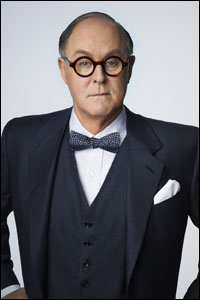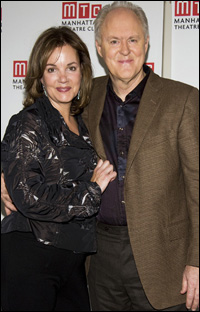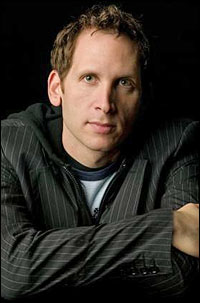
*
John Lithgow won his second Tony Award for playing the influential, bruising (and fictional) celebrity and gossip columnist JJ Hunsecker in the musical Sweet Smell of Success. He's now back on Broadway playing a real-life newspaperman from the same era — Joseph Alsop, whose political commentary was seen in newspapers around the country between the Depression and Vietnam War eras.
The Columnist is Tony- and Pulitzer Prize-winning playwright David Auburn's first play on Broadway since Proof, but it's not his first project since that smash. He's written and/or directed films ("The Lake House," "The Girl in the Park," "Proof"), directed plays Off-Broadway (Michael Weller's Side Effects) and regionally (A Delicate Balance) and penned adaptations of The New York Idea and The Journals of Mihail Sebastian, both seen Off-Broadway.
Auburn recently took a break from rehearsals to talk about The Columnist. The Daniel Sullivan-directed world premiere of the play is now in previews at Manhattan Theatre Club's Samuel J. Friedman Theatre.
Read more about The Columnist in the Playbill Vault. The 1989 New York Times obituary for Joseph Alsop said that his personal style included "an exaggerated old-school manner." He sounds like he was an over-the-top character.
David Auburn: [Laughs.] He was a huge, larger-than-life, flamboyant guy — the kind of person that you want to build a play around.
John Lithgow, your Alsop, played a dangerous fictional gossip columnist in Sweet Smell of Success. Are these characters cousins?
DA: Well, I wouldn't put it in that category because he really was a serious journalist. In no sense was he sort of like a gossip columnist or a scandalmonger. He was a serious foreign policy-oriented journalist, who had a lot of influence over public opinion and also was very close to the White House through a bunch of different presidencies and was really a Washington insider.
| |
 |
|
| John Lithgow as Joseph Alsop. | ||
| photo by Andrew Eccles |
DA: Yeah. In terms of personal style, he was famously charming and disarming and warm in many ways, but he also could be terrifying and scathing and domineering, so there are a lot of contradictions in the character that seemed to create opportunities for a lot of a drama.
Alsop's great objective in life was to contain or crush communism; he supported the Vietnam War. He was an ideologue.
DA: He was a New Deal Democrat: Liberal in a lot of social issues, but a very hardcore hawk on Vietnam. The play focuses on that as the thing that both made him so prominent and important and influential in his day, and also that undid him — Vietnam was the thing that made him and also ultimately caused him to lose his influence.
I'm curious about the seeds of this play. How did you first come to think of Joe Alsop as the subject of a play?
DA: I was interested in writing about journalists and war and influence and power and those kinds of things, and I started reading about Joe, and he was one of those people that sort of pops up in footnotes in a lot of different places. I realized, here was this person who was so well known, so influential — almost a household name in his day — and now he's completely obscure. The play came out of wondering, "How does that happen? How do you go from being that central figure to being, at first, a kind of joke and then almost forgotten?" It was in digging into that that I found the story.
| |
 |
|
| Margaret Colin (who plays Alsop's wife, Susan) and John Lithgow. | ||
| Photo by Joseph Marzullo/WENN |
DA: I don't think there's anybody who compares today. That's one of the really fascinating things to me. We no longer live in an era where four or five guys at newspapers wield the kind of influence that Alsop and a few other people had in his era. We have this kind of democratization, this diversification of opinion, which is a healthy thing today. But, in his era, a few people had a near monopoly, and that gave them a lot of power and a lot of influence, which they used for good and ill.
You must have done a lot of reading and research. At some point, you have to put it aside and write a play, to make it your own. Was that a challenge?
DA: Yeah, finding that balance is always tough. It's a "history play," so you want the history to be right, but the "play" part is important, too. It was a struggle throughout the drafts to find the right balance. I tried to wind up with a play that is a play and tells a story and has fictionalized elements — but is also very firmly grounded in the reality of the time and of his life. We'll find out if I hit that balance.
Are you naturally a history buff?
DA: I like to read as much as I can. I think about ten years ago I realized I knew nothing about Vietnam and started a little project to try and read as much as I could — not with any object of writing a play about it, but just because I wanted to know. And, sometimes when you do that, down the road a play does come out of it, and that's sort of what happened with this.
| |
 |
|
| Stephen Kunken plays liberal journalist David Halberstam in The Columnist. |
DA: He was convinced, I think, that he was fighting a rear-guard action against, especially, other journalists, who wanted America to fail in Vietnam. And, I think he saw his role as the champion of the American military effort over there, and one of the things the play does is try to dramatize the conflicts he had with the younger generation of reporters who were in Vietnam — people like David Halberstam, who hated everything that Joe stood for and hated the way he operated. So there was a real culture clash, a generational clash, a ideological clash between these two groups of people, and that's one of the threads in the play.
Is there a contradiction within Joe in that he's an aesthete as well — he's this hawk, but he's also a lover of art and theatre. Does the play touch on that?
DA: There were massive contradictions in the guy. He was this foreign policy uber-hawk, who was also very center-left on social issues. He was a gay man who was married. He was an incredibly vicious backstage in-fighter, who could also be incredibly generous and kind to people in his life, so all those contradictions make for a very juicy stew to make a play out of. And he had access to power.
DA: Incredible access. The famous story that's in the play is that on inauguration night, Jack Kennedy came to Joe's house for a drink after everything — after all the parties had ended. He was a Washington insider from a very early age. He was related to the Roosevelt family, and maintaining that insiderdom was one of the big efforts he made throughout his life. He was sort of famous for his dinner parties, where he would bring together the most glittering collection of Washington Big Shots. A lot of his interest in maintaining his insider status and his status as kingmaker in DC was at war with his desire to tell people what was really going on — another contradiction.
Have you talked to any surviving Alsop family members?
DA: Yes, I have. I don't want to seem like they necessarily approve of what's in the play, but I had the pleasure of getting to talk to people and learning firsthand about what he was like, which was great.
(Kenneth Jones is managing editor of Playbill.com. Follow him on Twitter @PlaybillKenneth.)









